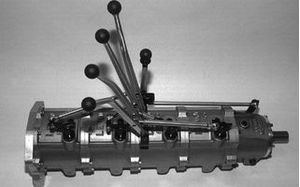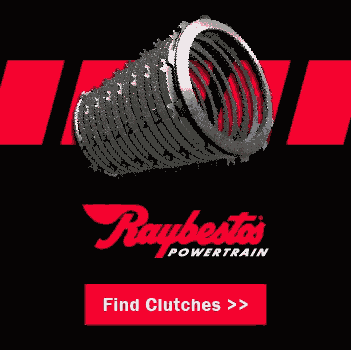
Tuning a torque converter becomes necessary when you seek to unlock the full potential of your vehicle's performance and efficiency. The factory settings of a torque converter may not always cater to your specific driving needs or desired outcomes. By tuning the torque converter, you can optimize various parameters such as stall speed, lockup engagement, and power transfer, resulting in enhanced acceleration, improved fuel efficiency, and better overall drivability. Whether you want quicker launches, increased towing capability, or better fuel economy, tuning your torque converter allows you to customize its behavior to suit your specific requirements. It's a way to fine-tune your vehicle's transmission system and unleash its hidden capabilities, transforming your driving experience to a whole new level of performance and satisfaction.
Why Would Someone Need to Tune a Torque Converter?
When considering torque converter tuning, several key factors should influence your decision-making process. These factors play a crucial role in determining the optimal tuning parameters for your vehicle's torque converter, ensuring that the results align with your specific performance goals and driving requirements. Here are the key factors to consider:
- Vehicle Application and Intended Use: The first factor to consider is how you plan to use your vehicle. Are you using it for daily commuting, towing heavy loads, or engaging in racing activities? Each application may require different torque converter tuning parameters to optimize performance, efficiency, and durability.
- Engine Characteristics: Understanding your engine's torque curve, powerband, and maximum RPM is essential for torque converter tuning. Matching the stall speed of the torque converter to the engine's characteristics allows for improved power transfer and optimal performance.
- Transmission Type and Gear Ratios: The type of transmission in your vehicle, such as automatic or manual, and the gear ratios it offers also influence torque converter tuning. The tuning parameters may differ based on the transmission's design and gear ratios to ensure seamless power delivery and efficient gear changes.
- Vehicle Weight and Tire Size: The weight of your vehicle and the size of your tires affect the torque converter's behavior. Heavier vehicles or vehicles with larger tires may require different tuning settings to account for the increased load and potential changes in gear ratios.
- Desired Performance Goals: Clearly defining your performance goals is crucial when making torque converter tuning decisions. Whether you prioritize quicker launches, improved acceleration, enhanced fuel economy, or a combination of factors, your goals will help guide the tuning process.
- Professional Expertise: While some enthusiasts may have the knowledge and experience to perform torque converter tuning themselves, seeking professional expertise is highly recommended. Transmission specialists and experienced tuners can analyze your vehicle's specific requirements, utilize specialized equipment, and ensure precise tuning for optimal results.
By considering these key factors, you can make informed decisions about torque converter tuning, ensuring that the tuning parameters are tailored to your vehicle's characteristics and aligned with your performance goals. The result will be a torque converter that maximizes power transfer, enhances performance, and provides a thrilling driving experience.
Where and When Tuned Torque Converters are Installed?
Tuned torque converters find applications in various vehicles and scenarios where optimized performance and efficiency are desired. Here are some examples of where tuned torque converters are commonly used:
- Racing and High-Performance Vehicles: In the world of motorsports, tuned torque converters are utilized to extract maximum performance from race cars. Whether it's drag racing, road course racing, or off-road competitions, tuned torque converters help provide quick and consistent launches, improved acceleration, and optimal power transfer to the wheels.
- Heavy-Duty Towing and Hauling: Vehicles used for towing or hauling heavy loads often benefit from tuned torque converters. By adjusting the stall speed and lockup engagement, torque converters can be tuned to generate higher torque at lower RPMs, enabling improved low-end power and enhancing the vehicle's ability to tow or haul heavy loads.
- Off-Road and 4x4 Vehicles: Off-road enthusiasts who engage in challenging terrains and steep inclines can benefit from tuned torque converters. Custom tuning allows for better torque multiplication, providing increased low-end power and improved throttle response, essential for conquering obstacles and maintaining traction in off-road conditions.
- Performance Street Cars: Tuned torque converters are popular among enthusiasts who want to enhance the performance of their street cars. By optimizing stall speed and lockup engagement, torque converters can provide improved launch control, better acceleration, and enhanced drivability for spirited driving on the street.
- Muscle Cars and Hot Rods: Vintage muscle cars and hot rods can greatly benefit from tuned torque converters. The tuning process can improve low-end torque, allowing for better street manners and more responsive throttle input, while still maintaining drivability in everyday conditions.
- Customized Builds and Engine Swaps: When undertaking custom vehicle builds or engine swaps, tuned torque converters are often necessary to ensure compatibility and optimal performance. Engine upgrades, changes in vehicle weight, or modifications to drivetrain components may require torque converter tuning to maximize power transfer and drivability.
It's important to note that tuned torque converters can be tailored to specific vehicle requirements and performance goals. Whether it's for racing, towing, off-roading, or customized applications, tuned torque converters offer a versatile solution to unlock the true potential of various vehicles in different scenarios.
Benefits of Torque Converter Tuning
- Improved Torque Multiplication and Power Transfer: By adjusting the stall speed of the torque converter, you can optimize the transfer of power from the engine to the transmission, resulting in enhanced torque multiplication and improved performance during launches and low-speed acceleration.
- Enhanced Launch and Acceleration Characteristics: Proper torque converter tuning ensures that the engine operates within its optimal power band, enabling quicker and smoother launches, rapid acceleration, and improved overall vehicle responsiveness.
- Increased Efficiency and Fuel Economy: Fine-tuning the torque converter can help reduce engine load and increase efficiency by matching the stall speed to the engine's torque curve. This optimization allows the engine to operate more efficiently, leading to better fuel economy and reduced fuel consumption.
- Reduction in Heat Generation and Transmission Wear: A well-tuned torque converter minimizes slippage and reduces heat buildup in the transmission, resulting in decreased wear and prolonging the life of the transmission components.
Factors Considered in Torque Converter Tuning
- Stall Speed Adjustment: The stall speed, at which the torque converter begins transferring power, can be adjusted to match the engine characteristics and the vehicle's intended application. Proper matching ensures optimal performance and prevents excessive slippage.
- Lockup Engagement: The lockup feature allows for a direct mechanical connection between the engine and transmission, reducing heat and improving efficiency. Determining the ideal lockup engagement point is crucial for maximizing performance and fuel economy.
- Converter Design and Materials: Evaluating the design and materials of the torque converter is important for efficiency and durability. Factors such as blade count, impeller design, and the use of high-quality materials impact the converter's performance characteristics.
DIY Torque Converter Tuning
For knowledgeable enthusiasts, basic torque converter tuning techniques can be explored. However, it is important to understand the limitations and potential risks associated with DIY tuning. It is recommended to have a thorough understanding of the vehicle's transmission system and access to the appropriate tools and resources.
For an example, when tuning a torque converter, certain parts and components may need to be installed or upgraded to achieve the desired performance enhancements. Here are some examples of parts that are commonly installed or modified during torque converter tuning:
- Torque Converter Clutch (TCC): The TCC is responsible for creating a direct mechanical connection between the engine and transmission, eliminating slippage and improving efficiency. Upgrading the TCC or installing a high-performance aftermarket TCC can enhance lockup engagement and overall transmission performance.
- Torque Converter Lockup Controller: A torque converter lockup controller allows for precise control and adjustment of the lockup engagement point. This aftermarket controller provides the flexibility to fine-tune the lockup behavior and optimize performance based on specific driving conditions and requirements.
- Torque Converter Impeller and Turbine: Upgrading the impeller and turbine within the torque converter can improve fluid flow and efficiency. Aftermarket impellers and turbines with enhanced design and materials can increase torque multiplication and optimize power transfer, resulting in improved performance and acceleration.
- Stator Modification: The stator is another component within the torque converter that can be modified to achieve desired performance characteristics. Stator modifications, such as altering vane angles or installing a high-performance aftermarket stator, can optimize fluid flow and torque multiplication, enhancing overall performance.
- Valve Body Modifications: In some cases, modifying the valve body of the transmission may be necessary to accommodate the changes made to the torque converter. Adjusting valve body characteristics, such as shift points and line pressure, can ensure proper coordination between the torque converter and the transmission for optimal performance.
- Transmission Cooler: When tuning a torque converter for increased performance, it is important to consider the impact on transmission fluid temperatures. Installing a larger or more efficient transmission cooler can help dissipate heat more effectively, ensuring that the transmission operates within safe temperature ranges even under demanding conditions.
These are just a few examples of the parts that may be installed or modified during torque converter tuning. It is important to consult with experienced transmission specialists or performance shops to determine the specific parts and modifications required based on your vehicle's make, model, and desired performance goals.
Professional Torque Converter Tuning: Consulting with experienced transmission specialists is vital for precise and effective torque converter tuning. These professionals have the expertise and specialized equipment necessary to analyze vehicle specifications, assess performance goals, and tailor the tuning process accordingly.
If you are seeking professional torque converter tuning services, look no further than Go4trans, an online directory of transmission experts and builders. With their comprehensive listing of trusted professionals, you can easily find experienced technicians and specialists who specialize in torque converter tuning.
By turning to Go4trans, you gain access to a network of skilled professionals who have extensive knowledge and expertise in optimizing torque converters for various applications. Whether you need tuning for racing and performance vehicles, heavy-duty towing, or customized builds, the directory provides a wide range of transmission experts who can cater to your specific needs.
Go4trans ensures that the professionals listed in their directory are reputable and have a proven track record of delivering high-quality services. They understand the intricacies of torque converters and can provide tailored solutions to unlock the full potential of your vehicle's performance.
Where to Tune Your Torque converter
Please note that this list is not exhaustive and it's always recommended to conduct your own research and check for the latest information. Here are a few notable companies in the US that can help:
- Circle D Specialties (Houston, TX) - Website
- Precision Industries (Wake Forest, NC) - Website
- Hughes Performance (Phoenix, AZ) - Website
- ProTorque Performance Products (Wilmington, NC) - Website
- TCI Automotive (Ashland, MS) - Website
- B&M Racing & Performance (Chatsworth, CA) - Website
- Yank Performance Converters (Southlake, TX) - Website
- PTC - Performance Torque Converters (Tyler, TX) - Website
- FTI Performance (Deland, FL) - Website
- Ultimate Converter Concepts (Knoxville, TN) - Website
These companies have established a reputation in the industry and are known for their expertise in torque converter tuning or providing high-quality tuned torque converters. However, it's important to research and compare their offerings, customer reviews, and services to determine which company best suits your specific needs and requirements.
Conclusion
Torque converter tuning plays a significant role in maximizing the performance and efficiency of a vehicle. With improved torque multiplication, enhanced acceleration characteristics, increased fuel economy, and reduced transmission wear, tuning the torque converter offers a range of benefits. Whether seeking professional assistance or venturing into DIY tuning, it is essential to understand the factors involved and their impact on your vehicle. By investing in torque converter tuning, you can unleash the full potential of your vehicle's powertrain, taking your driving experience to new heights.








